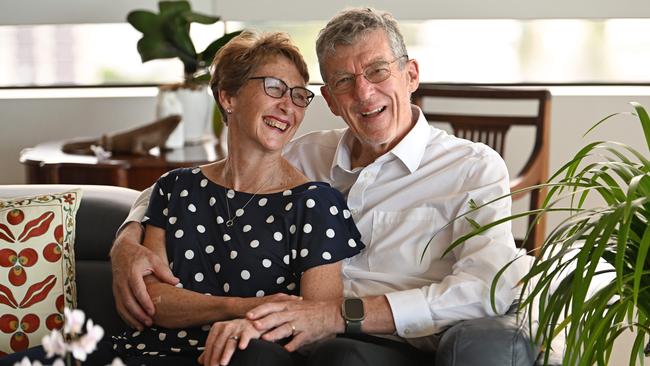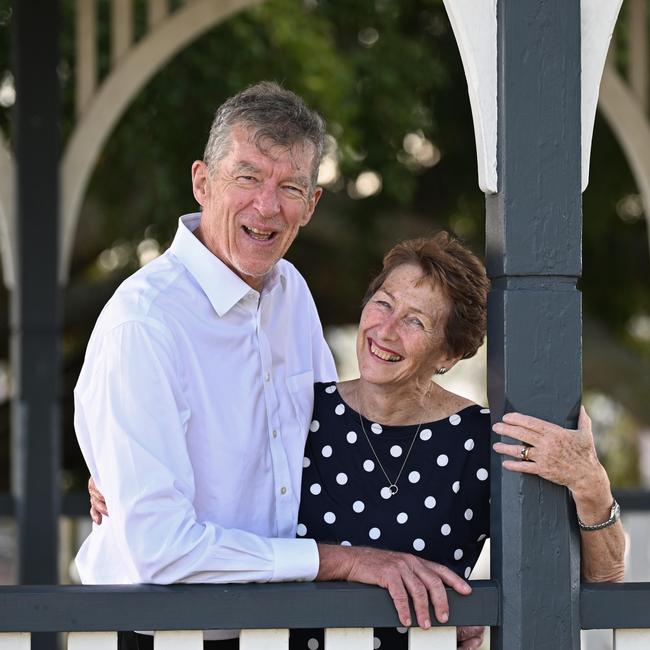Ian Frazer: God’s gift to women says ‘my work here is done’
You would think by now that Ian Frazer, who co-invented the world’s first cancer vaccine, had learned to take a compliment, to accept he might just be God’s gift to women.

You would think by now that Ian Frazer had learned to take a compliment, to accept he might just be God’s gift to women.
But the man who co-invented the world’s first cancer vaccine, which has gone into the arms of 440 million people and counting, is typically self-effaced when asked to reflect on this monumental achievement – if not the cheeky moniker coined by The Australian.
“I think it’s a testament to the benefits of medical research,” he said on announcing his retirement as a full-time professor at the University of Queensland.
“If you really put the money in, get good people involved with the problem, you come up with the solution. We probably need to do more of that because, I think, the most important message I would take out … is we face a lot of problems in health that could be solved with research.”
How fitting that Professor Frazer, 69, delivered his big news at the oration named in honour of his late partner in the lab, Jian Zhou, in Brisbane.
The Chinese-born scientist died without seeing their work come to fruition in the Gardasil vaccine, targeting the human papilloma virus linked to most cervical cancers.
Over the years Professor Frazer has been generous in acknowledging the contribution of his gifted colleague and friend: Zhou’s widow, Xiao Yi-sun, was on hand with son Andreas when he told a packed house at UQ’s Translational Research Institute he was stepping back in the lead-up to his 70th birthday in January.
But as emeritus professor he would see through his signature immunology research and supervision of two final doctoral students, part of what he sees as a personal responsibility to bring on the next generation of scientists.

“Our individual contribution to science might be remembered but what really counts will be the contribution of the 42 PhD students and 20 postdocs we have helped along their way,” Professor Frazer said. “Their contributions to research over 30 years include more than 400 peer-reviewed publications and it has been a pleasure to enable and assist them in this work.”
Modesty might stop him saying it, but his trailblazing work on the HPV vaccine – the first to prevent cancer – has changed countless lives for the better.
Today, 80 per cent of 15-year-old girls in Australia and a growing number of boys have received the jab, putting cervical cancer on track to be eliminated by 2035. The World Health Organisation says 116 countries now vaccinate against HPV and the 440 million people to date who have received Professor Frazer’s “useful” immuniser is growing by millions a year.
As uncomfortable as he still is with this newspaper branding him “God’s gift to women” in 2006, after Gardasil secured regulatory approval, that’s exactly what he turned out to be. His wife of 46 years, Caroline, said: “I think he was very flattered to be called that. We had a good laugh.”
Seriously proud of her husband, she said she was thrilled by what he had done to “help women everywhere”. Before the vaccine came along, cervical cancer was one of the biggest killers of women in this country despite population-wide screening for the disease. Globally, it claimed more than 250,000 lives a year.
The Australian Institute of Health and Welfare estimates that the number of cervical cancer cases here this year will fall to 942, heavily skewed to older women who for cultural or personal reasons declined to be tested. Some 222 deaths are expected, less than 1 per cent of cancer fatalities among Australian women.
Like Caroline, 68, Professor Frazer was born and educated in Scotland, where he followed his parents into medicine. They met at the University of Edinburgh while she was studying for an education degree. Four years after marrying in 1980, he was headhunted by the Walter and Eliza Hall Institute of Medical Research in Melbourne: they decided to stay in Australia, raising three boys.
When he went into immunotherapy, working out of a “broom closet” on the hospital campus that now houses the Translational Research Institute, which he heads, the field was in its infancy. The technology has gone on to spawn go-to treatments for cancer, while the new class of mRNA vaccines developed during the pandemic is being repurposed to stop tumours.




To join the conversation, please log in. Don't have an account? Register
Join the conversation, you are commenting as Logout